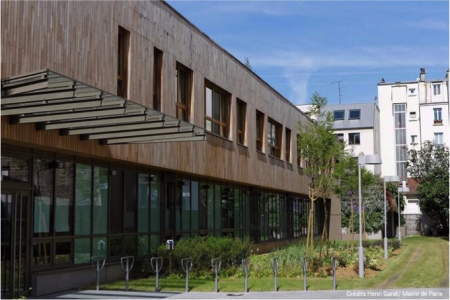
Area characterisation:
Scale of the project: object (building, etc.)
Urban density in which the NbS is implemented: high (dense city center, etc.)
Objective:
- Develop a school refurbishment in an ecological and participatory approach
- Contribute to the sustainable development of the well-being of children and educational community
Implementation of an ecological building (low-energy building) favorable for biodiversity, partial impervious pavement release, green spaces and vegetable gardens creation. This project is also notable for children and educational community consultation in its conception, making them as full stakeholders. The design reinforces the ecological networks at the district scale.
The project is combined with other environmental friendly solutions:
- Renewable energy system (solar panels, etc.)
- Bio-sourced materials
Financing:
Global (estimated) cost of the project: more than 5M€
Financing mechanism: cluster1 public financing
BUSINESS MODEL:
Business cluster:Social
Business model: Adopt a stewardship role
Business cluster:Technological
Business model: Substitute with renewables and natural processes
Transferability of result:
Process enablers:
Governance drivers → cocreation and participation
Knowledge drivers → Information accessibility
Expected time for the NbS to become fully effective after its implementation: short (immediately to few months)
Feedback: still well adapted
Expected life time of the intervention: around 25 years
Project delivered date: 2015
Client:
City of Paris
Design team:
- Jean-François SCHIMT (architecture and project manager)
Main partners:
- CAUE 75 (participative programme)
- TRIBU (technical partner for building conception)
Other stakeholders involving in the project:
- Citizens
GOVERNANCE MODEL:
Governance cluster: cluster5 network governance
Governance model: Collaborative governance
Contacts:
Alice Duquesnoy (alice.duquesnoy-mitjavila@plante-et-cite.fr)
Olivier Damas
Plante & Cité (https://www.plante-et-cite.fr/)
Maison du Végétal, 26 Rue Jean Dixmeras, 49000 Angers
NBS goals:
- Enhancing sustainable urbanization
- Developing climate change adaptation
- Nature-based solutions for improving well-being in urban areas
- Nature-based solutions for increasing the sustainable use of matter and energy
NBS benefits:
- Developing climate change adaptation; improving risk management and resilience
- Reducing temperature at meso or micro scale
- More energy efficient buildings
- Improve air quality
- Increase awareness of NBS solution & their effectiveness and co benefits
- Increase well-being
Further information:
Nature4Cities (https://www.nature4cities.eu/) aims to develop a knowledge diffusion around Nature-Based Solution (NbS) and a decision support platform through new collaborative models.
This project is part of the Nature4Cities's pioneer case studies database, it will feed the observatory, NbS pre-selection and replication tools, gathered into the Geocluster4NBS.
This project was chosen as a pioneer case study for the following reasons:
- This project has been built by consultation of pupils and the educational community
- It is an ecological school (education to gardening, awareness about biodiversity)
Nature4Cities project has received funding from the European Union’s Horizon 2020 research and innovation program under grant agreement No 730468.